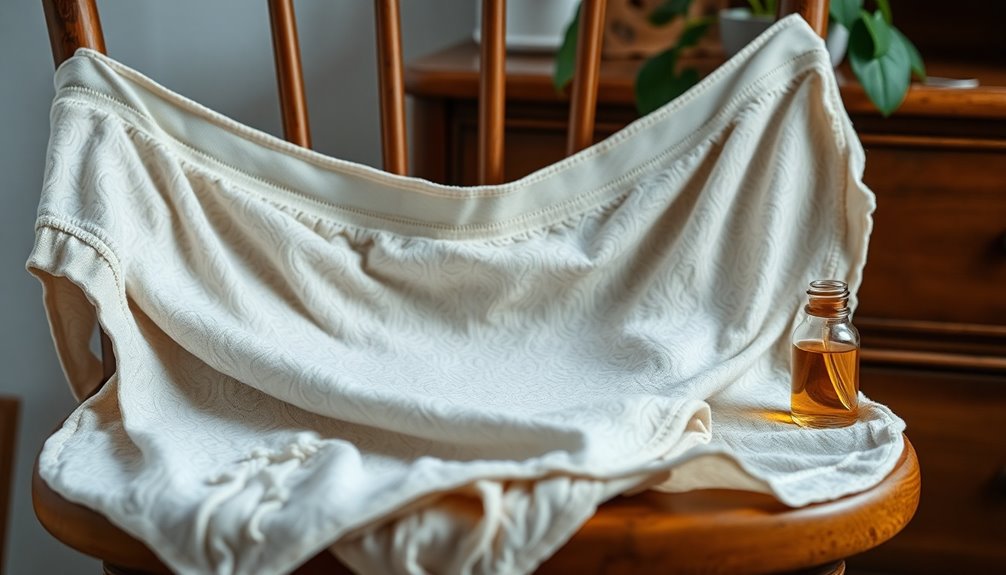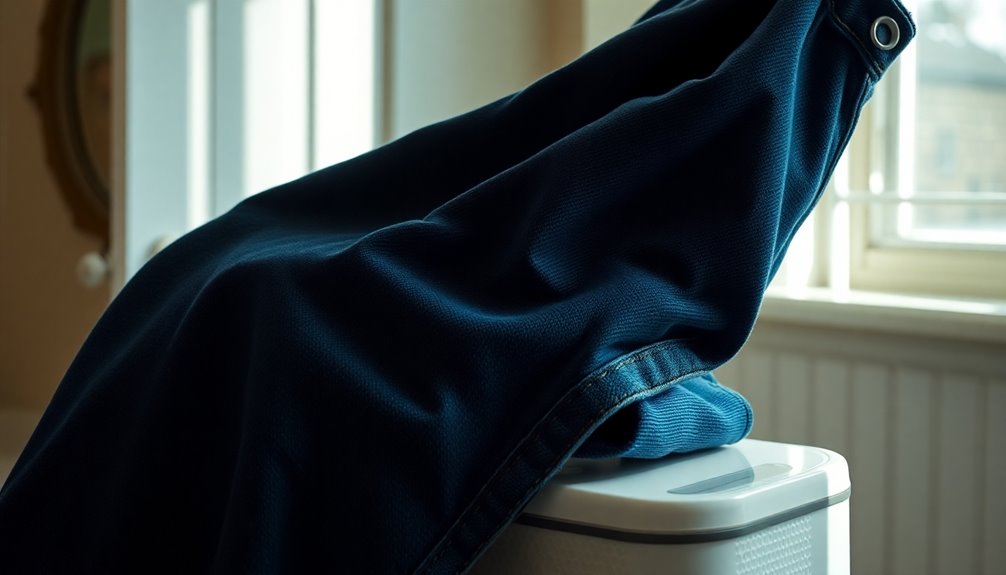You can smell yourself through your pants because of the natural dance between sweat, bacteria, and even what you've eaten. Your body produces sweat, which combines with skin bacteria to create odors, especially in areas like the groin. Foods like garlic or spicy dishes can amplify these scents. Hormonal changes can also play a role, impacting your body's smell. Poor hygiene and tight clothing can trap moisture, making things worse. If you're curious about managing this phenomenon effectively, there are practical tips and treatments that can help you regain your confidence.
Key Takeaways
- Body odor arises from sweat interacting with skin bacteria, leading to noticeable smells, especially in warm, moist areas like the groin.
- Certain foods, such as garlic and fish, can seep through the skin, altering body odor and making it more detectable through clothing.
- Hormonal changes during the menstrual cycle can disrupt vaginal pH, increasing the likelihood of odor that may be sensed through fabric.
- Poor hygiene practices, like infrequent washing or wearing non-breathable fabrics, can trap odors and make them more apparent through clothing.
- If persistent or unusual odors occur, it may indicate underlying health issues, warranting a consultation with a healthcare professional.
Understanding Body Odor
Body odor is a natural phenomenon that everyone experiences, and it primarily stems from the interaction of sweat with skin bacteria. Your sweat glands produce moisture, which is a perfect breeding ground for bacteria. When these bacteria break down sweat, they release odoriferous compounds, leading to body odor you can sometimes smell through your pants.
Factors like hormonal changes and your diet can greatly influence how strong your body odor is. For instance, spicy foods or certain medications can intensify it. Areas such as your underarms, groin, and feet are particularly prone to odor due to a higher concentration of sweat glands and bacteria.
If you're dealing with hyperhidrosis, excessive sweating can make the situation worse, creating a moist environment that encourages bacteria to thrive.
To keep body odor in check, focus on effective personal hygiene practices. Regularly showering with mild soap and wearing breathable fabrics can help manage odor greatly. Staying on top of your hygiene routine not only helps you smell fresh but also boosts your confidence throughout the day. Additionally, proper nutrition is essential for overall body health, as it can influence factors like sweat production and body odor.
Causes of Vaginal Odor

Odor isn't just limited to body areas like your underarms; it can also be a concern in the vaginal region. Vaginal odor can arise from several factors, primarily linked to your vaginal health.
One common issue is bacterial vaginosis (BV), which often produces a strong fishy smell, especially after sexual intercourse due to an overgrowth of harmful bacteria.
Your vagina has a natural pH balance that typically ranges from 3.5 to 4.5. Disruptions in this balance can lead to unpleasant scents. Hormonal changes during menstruation, pregnancy, or menopause can also alter your vaginal scent, resulting in variations in odor strength and type.
Infections, like yeast infections and sexually transmitted infections (STIs), including trichomoniasis and chlamydia, can create distinctive odors. These often come with unusual discharge or irritation, indicating a need for medical attention.
Lifestyle factors play a role too; poor hygiene, an unbalanced diet, and excessive sweating can contribute to vaginal odor.
Maintaining good hygiene, wearing breathable clothing, and being mindful of your health can greatly help manage and reduce vaginal odor.
Common Infections and Conditions

If you notice a fishy odor after sex, you might be experiencing bacterial vaginosis, which happens when there's an imbalance in vaginal bacteria.
On the other hand, if you smell something yeasty along with thick, white discharge, a yeast infection could be the culprit.
Understanding these common conditions can help you address the issue effectively.
Bacterial Vaginosis Symptoms
Many women experience the unsettling symptoms of bacterial vaginosis (BV), which can disrupt both comfort and confidence. BV occurs when there's an imbalance of normal vaginal bacteria, often leading to noticeable changes.
Here's what you might notice:
- A fishy odor, particularly after sexual intercourse
- Gray or white vaginal discharge
- Itching or irritation in the vaginal area
- A burning sensation during urination
- Unusual odor, especially after menstruation
With an estimated 21 million women affected annually in the U.S., BV is especially common among women of childbearing age. Factors like douching, new sexual partners, and hormonal changes can trigger it.
Diagnosis usually involves a pelvic exam, pH testing of your vaginal secretions, and discharge analysis to identify clue cells. If you suspect you have BV, it's crucial to consult a healthcare provider.
Treatment typically involves antibiotics such as metronidazole or clindamycin. If you experience recurrent symptoms, don't hesitate to address these with your healthcare professional.
Understanding these symptoms can help you regain comfort and confidence, ensuring your health remains a priority.
Yeast Infection Indicators
Bacterial vaginosis isn't the only condition that can affect your vaginal health; yeast infections are another common issue many women face. Caused by an overgrowth of Candida fungi, these infections can lead to symptoms like itching, burning, and a thick, white discharge that often has a distinct musty odor, sometimes even detectable through clothing.
To help you identify the indicators of a yeast infection, here's a quick reference table:
| Indicator | Description |
|---|---|
| Odor | Musty or similar to bread |
| Discharge | Thick, white, and clumpy |
| Itching | Persistent and often intense |
| Burning | Discomfort during urination or intercourse |
| Treatment | Antifungal medications from a healthcare provider |
If you suspect you have a yeast infection, consult your healthcare provider for a proper diagnosis. Treatment usually involves antifungal medications, available over-the-counter or by prescription. Practicing good hygiene and maintaining a balanced diet can help prevent these infections and their associated odors, ensuring your vaginal health remains in check.
The Role of Hormones

Hormones play a crucial role in the way your body emits scent, particularly when it comes to vaginal odor. Hormonal fluctuations throughout your menstrual cycle can greatly alter vaginal pH levels, which in turn can lead to noticeable changes in odor, even through your clothing.
Here's how hormones affect your scent:
- Increased estrogen levels during ovulation may create a more alkaline environment, promoting the growth of odor-causing bacteria.
- Hormonal changes during pregnancy often lead to increased vaginal discharge and noticeable shifts in scent.
- Conditions like polycystic ovary syndrome (PCOS) can disrupt normal vaginal flora, resulting in unusual odors.
- Menopause decreases estrogen production, leading to vaginal dryness and changes in odor that can be detected more easily.
- Your body's natural balance can be thrown off, making you more aware of your own scent.
Understanding the relationship between hormonal changes and vaginal odor can help you navigate these fluctuations.
It's important to recognize that these changes are normal, and being aware of them can empower you to take control of your body's health.
Importance of Hygiene Practices

Maintaining good hygiene practices is essential for reducing body odor, especially in the intimate areas. Regular hygiene habits, like daily bathing with mild soap, help you wash away sweat, bacteria, and other odor-causing substances from your skin. This simple step can make a significant difference in how fresh you feel throughout the day. Additionally, essential oils can be used in moderation to enhance your hygiene routine and provide a pleasant scent.
Wearing breathable fabrics, such as cotton, allows for better air circulation. This reduces moisture buildup that can lead to unpleasant odors in the groin area. If you engage in physical activities, be sure to change out of sweaty or damp clothing promptly. This practice prevents bacteria and fungi from thriving in warm, moist environments.
Staying properly hydrated supports your body's natural detoxification processes, which can help mitigate strong odors, particularly from urine. Additionally, avoiding douching and heavily scented personal care products helps preserve your natural vaginal pH balance, reducing the risk of odor and irritation. Incorporating high vibrational energy(https://example.com) into your daily routine can also enhance your overall well-being and contribute to a fresher sense of self.
Dietary Influences on Odor

Your diet plays a significant role in how you smell, from the garlic and onions you love to the hydration you maintain.
If you often consume processed foods, you might notice a stronger odor due to imbalances in your gut.
Plus, staying hydrated can help dilute waste products, making a noticeable difference in your overall scent.
Foods That Alter Odor
Many people don't realize how much their diet can influence body odor. The foods you eat can markedly impact how you smell, often in surprising ways. Here are some foods that alter odor:
- Garlic and onion: These contain sulfur compounds that can seep through your skin, leading to noticeable body odor.
- Fish: Certain types can impart a strong smell due to their unique compounds.
- Spicy foods: They boost sweat production, amplifying the scent of the food itself.
- Processed foods: Diets high in sugar and processed ingredients disrupt your microbiome, potentially increasing body odor.
- Probiotics and fermented foods: These can help balance your gut flora, promoting a healthier body odor overall.
If you want to manage your body odor effectively, be mindful of your diet.
While hydration plays an essential role in odor management, focusing on the foods you consume can lead to considerable changes.
Hydration's Role in Smell
Hydration considerably impacts how your body smells, particularly when it comes to sweat and urine. When you're well-hydrated, your body maintains ideal pH levels, which helps reduce strong odors.
Drinking enough water and consuming water-rich foods, like fruits and vegetables, dilutes your bodily fluids. This dilution lowers the concentration of odor-causing compounds, leading to less noticeable smells.
On the flip side, dehydration can lead to concentrated urine, causing stronger, ammonia-like odors that are more likely to seep through your clothing. You might notice that when you're not drinking enough fluids, your body odor becomes more potent.
Diet also plays a significant role in your overall health and scent. Certain foods, such as asparagus and garlic, contain high sulfur content, which can alter your natural body odor. Additionally, a balanced diet can further support your body's ability to manage odors effectively.
Impact of Supplements
Supplements can considerably influence your body odor, often in ways you mightn't expect. The right supplements can help maintain a healthy pH and promote good bacteria, while the wrong ones might lead to stronger odors.
Here's how various supplements can impact your scent:
- Probiotics: Found in yogurt and kefir, they support a healthy vaginal microbiome, potentially reducing vaginal odors. Engaging in dog companionship can also promote overall well-being, which may lead to a more pleasant body scent. Additionally, a diet rich in high-quality protein sources can contribute to better body odor management. Furthermore, using educational toys can enhance cognitive skills and emotional intelligence, creating a holistic approach to well-being. Including rapeseed honey in your diet may also support digestive health, which can positively influence body odor.
- Zinc: This mineral helps regulate sweat production, which can affect your overall body scent.
- Fiber supplements: These can aid digestion, reducing the risk of odor-causing bacteria.
- Vitamin B: Particularly B1 and B6, they can influence how your body metabolizes certain foods, affecting your natural scent.
- Hydration supplements: Staying hydrated dilutes urine, flushing out toxins and reducing ammonia-like odors.
- Regular consumption of herbal remedies can also promote overall health, which may lead to a more pleasant body scent.
Impact of Clothing Choices

When it comes to personal odor, the impact of your clothing choices can't be underestimated. The fabrics you wear play a notable role in how moisture and odor-causing bacteria interact with your body.
Synthetic materials often trap moisture and bacteria, leading to stronger odors compared to breathable fabrics like cotton. If you're wearing tight-fitting clothing, you're restricting airflow, which can cause you to sweat more and amplify odors.
To combat this, consider looser-fitting garments that allow better ventilation. Regularly changing clothes, especially after sweating or physical activity, is essential for minimizing odor buildup.
When you wash your clothes, opting for strong detergents can effectively eliminate odor-causing bacteria, while fabric softeners may leave residues that trap smells.
Also, consider wearing moisture-wicking underwear. These specially designed fabrics help keep the area dry and enhance breathability, reducing the chances of developing unpleasant odors.
When to Seek Medical Help

Persistent or unusual odors can be more than just an inconvenience; they might signal underlying health issues that need attention. If you notice a persistent or strong odor, it's vital to consult your healthcare provider to rule out infections or other conditions. In some cases, emotional stress or narcissistic relationships can also impact your physical health and lead to unusual symptoms. Recognizing patterns of emotional coldness in relationships may also help address stressors that affect your overall well-being. Additionally, maintaining a healthy diet can contribute to overall wellness, which may help mitigate some odor issues. Furthermore, managing emotional dysregulation is key to preventing stress-related health issues. Addressing these concerns holistically can lead to improved physical and emotional health, reducing stress-induced symptoms. For individuals grappling with challenging family dynamics, such as questioning “is my parent a narcissist,” seeking therapy or professional support can provide clarity and tools for coping. Ultimately, understanding and addressing the root causes of both physical and emotional stress is essential for achieving long-term wellness.
Here are some signs that should prompt you to seek medical help:
- A sudden change in vaginal odor, especially if it becomes fishy or foul.
- Accompanying symptoms like itching or burning.
- Unusual discharge that differs from your norm.
- Discomfort during urination or sexual activity.
- If you're pregnant and notice strong or unusual odors.
Ignoring these signs could lead to complications, as they may indicate infections such as bacterial vaginosis or yeast infections. Additionally, experiencing chronic stress can exacerbate physical symptoms and impact your overall health.
Early intervention can make a significant difference in your health. Regular gynecological check-ups are also essential for maintaining vaginal health and addressing potential issues before they escalate.
If you experience any of these symptoms, don't hesitate to seek medical attention; your well-being is important. Remember, it's always better to be proactive when it comes to your health.
Treatment Options Available

When you're dealing with persistent odors, it's essential to consult a healthcare provider for a proper diagnosis.
Alongside seeking medical advice, maintaining good hygiene practices can help manage and prevent odors effectively.
You'll also find various treatment options, from antibiotics to over-the-counter medications, that can address the underlying issues.
Medical Consultation Necessity
Addressing unusual vaginal odors promptly is essential for your health, as they can signal infections like bacterial vaginosis or sexually transmitted infections. Ignoring persistent vaginal odor can lead to complications, making a medical consultation crucial.
Here's what you might experience that warrants a visit to your healthcare provider:
- Persistent vaginal odor
- Abnormal discharge
- Itching or burning sensations
- Pain during intercourse
- Unusual menstrual changes
During your consultation, healthcare providers can perform diagnostic tests, including vaginal exams and pH checks, to identify the underlying cause of your symptoms.
Treatment options vary depending on the diagnosis. For bacterial vaginosis, antibiotics like metronidazole or clindamycin are commonly prescribed to resolve your symptoms effectively. If you have a yeast infection, over-the-counter antifungal medications may help, but persistent symptoms require professional evaluation.
Hygiene Practices Importance
Maintaining proper hygiene is key to preventing unpleasant vaginal odors and guaranteeing overall vaginal health. Regular bathing with mild soap helps remove sweat and bacteria that can cause odors in the groin area. You should prioritize hygiene practices like changing clothes after exercise to prevent odor retention caused by sweat.
Opt for breathable cotton underwear, as it greatly reduces moisture buildup, creating an environment less favorable for bacteria and fungi. This simple switch can make a big difference in odor control.
Additionally, avoid douching and strongly scented personal care products; they can disrupt your vagina's normal pH balance, leading to odor issues.
If you notice persistent odors, it's important to pay attention, especially if accompanied by abnormal discharge or discomfort. These symptoms could indicate a potential infection or imbalance, and seeking medical attention promptly can guarantee a timely diagnosis.
Treatment Modalities Available
Several effective treatment options are available for persistent vaginal odor, ensuring you can regain comfort and confidence.
When addressing this issue, it's vital to identify the underlying cause, as various treatment modalities may be required. Here are some options you might consider:
- Antibiotics like Metronidazole or Clindamycin for bacterial vaginosis, which often has a fishy smell.
- Over-the-counter antifungal medications to treat yeast infections that cause thick, white discharge and itching.
- Antibiotics for urinary tract infections (UTIs), which can lead to strong-smelling urine and discomfort.
- Specific antifungal treatments prescribed by your healthcare provider for sexually transmitted infections (STIs) like trichomoniasis.
- Regular consultations with your healthcare provider for accurate diagnosis and tailored treatments if unusual odors persist.
Additionally, maintaining good hygiene and using products like hydrocolloid patches can help manage related skin issues effectively.
Each of these treatment options targets different causes of odor, ensuring you find the right relief.
It's important to consult your healthcare provider to discuss symptoms and choose the best course of action for your situation.
Taking these steps can help you achieve a healthier and more comfortable experience.
Tips for Odor Management

Effective odor management starts with good hygiene practices. Shower regularly using mild soap to keep your groin area clean, and always wear fresh, breathable cotton underwear. These simple steps help minimize vaginal odor by reducing odor buildup.
Staying hydrated is also essential, as it dilutes bodily fluids, preventing concentrated urine from creating strong ammonia odors.
When engaging in physical activities, opt for moisture-wicking fabrics. They can considerably reduce sweating and bacterial growth, which are common causes of unpleasant odors.
Be cautious with your choice of products; avoid heavily scented items and douching, as they can disrupt the natural pH level of your vaginal area, leading to increased odors. It’s essential to prioritize your well-being and comfort when selecting personal care items. Additionally, if you’re exploring intimacy with toys, learning how to choose the right toy can enhance your experience while ensuring your safety. Look for body-safe materials and make sure to maintain proper hygiene to further protect your natural balance.
Incorporating lifestyle changes, like a balanced diet and regular exercise, can further support your overall hygiene.
Finally, don't neglect regular medical check-ups. Persistent or unusual odors might signal underlying health issues that require professional attention.
Frequently Asked Questions
Why Can I Smell Down There Through My Pants?
You might smell down there through your pants due to natural odors intensified by sweat, hormonal changes, or bacteria. Poor hygiene and certain foods can also amplify these scents, making them more noticeable.
Can Others Smell Me if I Smell Myself?
If you can smell yourself, it's likely others can too, especially in close quarters. Factors like sweat, bacteria, and hygiene play a role in how strong that scent might be perceived by those around you.
How Do I Stop My Private Area From Smelling Bad?
Imagine walking through a garden, fresh and vibrant. To stop your private area from smelling bad, shower regularly, wear breathable cotton, stay hydrated, avoid douching, and change clothes often for a confident, clean feeling.
How to Avoid Urine Smell in Pants for Females?
To avoid urine smell in your pants, stay hydrated, change underwear regularly, and wear breathable fabrics. Practice good hygiene, use panty liners, and monitor any health issues to keep odors at bay.
Conclusion
To sum up, it's totally normal to notice your own scent, especially through clothing. Did you know that about 75% of women experience some form of vaginal odor at some point in their lives? Understanding the causes can help you manage it effectively. By maintaining good hygiene, choosing breathable fabrics, and being aware of your body, you can keep things fresh. If you ever feel concerned, don't hesitate to consult a healthcare professional for peace of mind.









